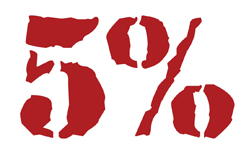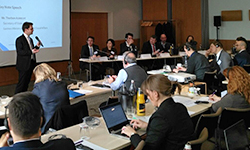BusinessEurope Headlines No. 2017-06
CETA - delivering for Europe and Europeans
 "We welcome the European Parliament’s vote making this long awaited agreement a reality", Markus J. Beyrer, BusinessEurope Director General, commented on 15 February after the decision on ratification of the CETA deal between the European Union and Canada. The agreement, so far the most progressive one concluded by the EU, was approved by MEPs with 408 votes in favour, 254 against and 33 abstentions. "The vote cast today shows Europe is able to deliver to its citizens and ready to open up opportunities for them in these turbulent times", Mr Beyrer added during a meeting with François-Philippe Champagne, Canada's International Trade Minister. CETA will be an engine of economic prosperity for the EU and Canada and will also bring our people and cultures closer together. With protectionist trends growing stronger by the day, the EU has sent a clear signal that it is open to partners willing to share its values and vision about global trade. Together, the EU and Canada not only open their markets, but also pave the way for a reformed trade agenda, one that will harness globalisation to the benefit of society at large.
"We welcome the European Parliament’s vote making this long awaited agreement a reality", Markus J. Beyrer, BusinessEurope Director General, commented on 15 February after the decision on ratification of the CETA deal between the European Union and Canada. The agreement, so far the most progressive one concluded by the EU, was approved by MEPs with 408 votes in favour, 254 against and 33 abstentions. "The vote cast today shows Europe is able to deliver to its citizens and ready to open up opportunities for them in these turbulent times", Mr Beyrer added during a meeting with François-Philippe Champagne, Canada's International Trade Minister. CETA will be an engine of economic prosperity for the EU and Canada and will also bring our people and cultures closer together. With protectionist trends growing stronger by the day, the EU has sent a clear signal that it is open to partners willing to share its values and vision about global trade. Together, the EU and Canada not only open their markets, but also pave the way for a reformed trade agenda, one that will harness globalisation to the benefit of society at large.
Contact: Eleonora Catella
EU ETS reform and the importance of the 5% allowance shift
 “The EU emissions trading system (ETS) should be the central policy tool to achieve cost-effective greenhouse gas emission reductions. It should include a meaningful carbon price and at the same time safeguard the global competitiveness of EU industries”, BusinessEurope Director General Markus J. Beyrer wrote to José A. Herrera, Malta’s Minister for the environment, on 8 February. “BusinessEurope is therefore very concerned about the Maltese Presidency’s proposal to shift only 1% from auctioned allowances to free allowances”, he continued. At least a 5% shift is needed to keep the European industry at the level of the best performers, and reduce other risks associated with the design of the system. Mr Beyrer also urged Mr Herrera not to close the negotiation on other key issues for the European business community: “No deal by 28 February is better than a bad deal. Otherwise, the risk of investment leaking to countries outside Europe with less climate ambition remains real, and we might fail to reach the Paris Agreement’s objectives. I believe I speak for all, when I say that nobody wants that to happen. Let that be the common purpose of the EU ETS reform.”
“The EU emissions trading system (ETS) should be the central policy tool to achieve cost-effective greenhouse gas emission reductions. It should include a meaningful carbon price and at the same time safeguard the global competitiveness of EU industries”, BusinessEurope Director General Markus J. Beyrer wrote to José A. Herrera, Malta’s Minister for the environment, on 8 February. “BusinessEurope is therefore very concerned about the Maltese Presidency’s proposal to shift only 1% from auctioned allowances to free allowances”, he continued. At least a 5% shift is needed to keep the European industry at the level of the best performers, and reduce other risks associated with the design of the system. Mr Beyrer also urged Mr Herrera not to close the negotiation on other key issues for the European business community: “No deal by 28 February is better than a bad deal. Otherwise, the risk of investment leaking to countries outside Europe with less climate ambition remains real, and we might fail to reach the Paris Agreement’s objectives. I believe I speak for all, when I say that nobody wants that to happen. Let that be the common purpose of the EU ETS reform.”
![]() Contact: Leon de Graaf
Contact: Leon de Graaf
European social partners discuss work-related aspects of digitalisation in Berlin
 The EU social partners - BusinessEurope, UEAPME, CEEP and ETUC - organised a seminar on digitalisation on 14 February 2017 in Berlin. Participants discussed the labour market aspects of changes brought by digitalisation. Maxime Cerutti, Social Affairs Director, stressed that the key challenge is for labour markets to keep pace with the rapidly changing needs of companies deriving from more individualised and real-time consumer demands. Examples were shared of how social partners can contribute at the national, sectoral and company levels in terms of preparing the workforce, adapting training systems, ensuring flexibility in work organisation, addressing work-life balance issues, as well as improving health and safety at work. The seminar programme also included interventions by the German Ministry of Labour and Social Affairs, University of Tübingen, and OECD.
The EU social partners - BusinessEurope, UEAPME, CEEP and ETUC - organised a seminar on digitalisation on 14 February 2017 in Berlin. Participants discussed the labour market aspects of changes brought by digitalisation. Maxime Cerutti, Social Affairs Director, stressed that the key challenge is for labour markets to keep pace with the rapidly changing needs of companies deriving from more individualised and real-time consumer demands. Examples were shared of how social partners can contribute at the national, sectoral and company levels in terms of preparing the workforce, adapting training systems, ensuring flexibility in work organisation, addressing work-life balance issues, as well as improving health and safety at work. The seminar programme also included interventions by the German Ministry of Labour and Social Affairs, University of Tübingen, and OECD.
Contact: Magdalena Bober
Companies need a harmonised framework for data privacy in Europe
 A coordinated approach for implementation of the new EU framework for data protection across the single market is essential for both consumers and businesses. The General Data Protection Regulation (GDPR) adopted in 2016 will enter into force in May 2018. Business across sectors are concerned that the original intention of applying a single set of data protection rules will not be achieved by the GDPR. Member states and the European Commission should use this period to ensure the GDPR is implemented and applied consistently. We should not have different approaches in different countries. Implementation should be business-friendly and avoid unbalanced or unclear application of the new requirements.
A coordinated approach for implementation of the new EU framework for data protection across the single market is essential for both consumers and businesses. The General Data Protection Regulation (GDPR) adopted in 2016 will enter into force in May 2018. Business across sectors are concerned that the original intention of applying a single set of data protection rules will not be achieved by the GDPR. Member states and the European Commission should use this period to ensure the GDPR is implemented and applied consistently. We should not have different approaches in different countries. Implementation should be business-friendly and avoid unbalanced or unclear application of the new requirements.
![]() Contact: Guido Lobrano
Contact: Guido Lobrano
Guidelines should stick to the true intentions of the General Data Protection Regulation
 On Monday 13 February, BusinessEurope sent a letter to the Article 29 Working Party (WP 29) in response to their recent consultation on the first round of draft General Data Protection Regulation (GDPR) guidelines. These are currently being prepared by the WP 29 for the GDPR’s full application in May 2018. To ensure consistent application of the new framework in practice, BusinessEurope will continue to monitor the work of the WP 29 and will identify inconsistencies or problematic trends in practice to them. The guidelines should aid the GDPR’s true intentions. They should not seek to broaden them in practice as it is currently the case for the new data portability right which includes data generated during the use of the service. BusinessEurope also sent comments on the Data Protection Officer and the Lead Supervisory Authority. It is vital that the process of drafting guidelines remains transparent and enables stakeholders who will eventually be responsible for applying the new rules to continue having input.
On Monday 13 February, BusinessEurope sent a letter to the Article 29 Working Party (WP 29) in response to their recent consultation on the first round of draft General Data Protection Regulation (GDPR) guidelines. These are currently being prepared by the WP 29 for the GDPR’s full application in May 2018. To ensure consistent application of the new framework in practice, BusinessEurope will continue to monitor the work of the WP 29 and will identify inconsistencies or problematic trends in practice to them. The guidelines should aid the GDPR’s true intentions. They should not seek to broaden them in practice as it is currently the case for the new data portability right which includes data generated during the use of the service. BusinessEurope also sent comments on the Data Protection Officer and the Lead Supervisory Authority. It is vital that the process of drafting guidelines remains transparent and enables stakeholders who will eventually be responsible for applying the new rules to continue having input.
![]() Contact: Patrick Grant
Contact: Patrick Grant
Calendar
 20 February 2017: meeting of the Eurogroup
20 February 2017: meeting of the Eurogroup- 20 February 2017: Competitiveness Council
- 21 February 2017: Economic and Financial Affairs Council
- 21 February 2017: "Is the European single market SME-friendly? What do SMEs actually need?" BusinessEurope conference, Brussels
- 28 February 2017: Preventive restructuring and second chance for entrepreneurs: what's in it for SMEs?, Acca, BusinessEurope and UEAPME conference, Brussels